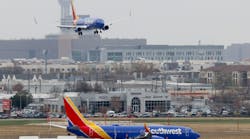How Southwest’s Holiday Meltdown Could Cause Long-Term Damage to Airline’s Reputation
Dec. 30—For Hussain Gilani, a nephrologist from Houston who now lives in California, traveling with Southwest Airlines has long had some practical benefits.
Yet while the airline's point-to-point model allows him to fly nonstop from the smaller Oakland International Airport to Houston Hobby and still work a full day, there are downsides, he said Thursday after he spent days scrambling to make backup travel plans because the airline's cancellation meltdown left his wife and their 4-year-old daughter stranded.
"I ended up meeting up with her at a McDonald's in Corsicana at midnight," Gilani said, after summarizing the elaborate, last-minute backup plan. "I just wanted to see my kid, and I just wanted to see her."
In the future, he added, he's inclined to fly United from San Francisco when he returns to Houston.
Many Southwest passengers are feeling the same way after the weeklong meltdown saw the airline cancel thousands of flights across the country, leaving some 2 million travelers inconvenienced, bereft of their luggage or worse.
Tapping the 'reservoir of goodwill'
Southwest needs to take steps now to regain the confidence of its passengers, airline industry and management experts said, something it has historically enjoyed compared to most other major domestic carriers, especially in Texas, where it is based.
" Southwest was such a good company. It had such a good reputation," said Michael Davis, a professor of economics as Southern Methodist University in Dallas. "You can't quantify that, but it's kind of a cool thing."
Said David M. Primo, a professor of political science and business administration at the University of Rochester: "The thing about reputation is that it takes years to build up, but it can disappear in an instant.
"I think they do have this reservoir of goodwill built up which is going to help them navigate this crisis," Primo continued. "But a lot is going to depend on what they do for their affected customers, and whether they can demonstrate they have the expertise to make sure this doesn't happen again."
Davis said the first step is "to stop the bleeding."
"You've got to get back on schedule," he said.
As of Friday, there were signs that Southwest was returning to normalcy. Just 43 of its flights were canceled over the course of the morning, a rate of 1 percent, according to data from the flight-tracking service FlightAware.
The airline had issued several apologies over the course of the week, one via video message from CEO Bob Jordan, who has held that post since February. "We're doing everything we can to return to a normal operation," said Jordan. "And please also hear that I am truly sorry."
"There's just no way, almost, to apologize enough," he added in an interview Friday with ABC's " Good Morning America."
The message was a necessary step, said aviation consultant Robert Mann — but not a sufficient one. "Saying you're sorry really doesn't solve the problem," Mann said Friday. "Don't tell me you're sorry; fix it."
In this case, he continued, that means compensating the affected passengers and overhauling the telephone-based scheduling system that melted down this week.
'Fix the problem'
Davis, at SMU, agrees.
"They can issue all the apologies they want but what they really need to do — and I know they know this — is, they need to fix the problem," he said. "If the issues were with their communications systems, as it seems to be, technology can fix that. They need to make sure they have the right technology."
Southwest has acknowledged the need for such changes. "We will honor reasonable requests for reimbursement for meals, hotel and alternate transportation," the airline said in a statement this week.
"That's actually quite generous by comparison to their contract of carriage," Mann said, adding that because Southwest has taken this stance publicly, it would be unwise to walk it back. "Under the circumstances, do you want to make the problem worse?"
Fixing the technological issues could take more than a year, experts suggested, and because of Southwest's point-to-point system, it can't simply adopt the technology that other carriers use for their hub-and-spoke operations.
Still, there is a sense among industry observers that Southwest can recover from the week's debacle.
"The core business model at Southwest is actually not a bad one," Davis said. "The idea of providing point-to-point transportation using a common fleet of aircraft, that's a really good idea. They just have to do it right."
The JetBlue comparison
Mann pointed to a similar crisis that affected JetBlue over Valentine's Day weekend in 2007, after the airline's telephone-based scheduling system broke down, rendering it impossible to connect crew members with airplanes for several days.
The debacle dampened some of the "rabid loyalty" JetBlue enjoyed in the New York area, Mann said, but the Queens-headquartered airline survived the crisis, upgraded its systems and has not had a similar meltdown since.
"There are people that'll tell you, 'I'll never fly Southwest again,' and next week they'll fly Southwest again if they get a good fare," Mann added. "This is the reality of unlimited demand for low-fare air travel."
Some Texans, at least, may expect a bit more from the Dallas-headquartered airline.
" Southwest is almost always convenient and reliable, or it has been," said traveler Scott Bowen, who works for a refining company in Houston and ended up driving back from Denver after spending Christmas in Colorado with family when Southwest canceled his return flight. "I've always just thought of them as being much more accommodating, too."
Now he, like many affected passengers, is essentially accommodating the airline. He'd like to be reimbursed for the unexpected expenses incurred for his rental car, the gas and a hotel room in Amarillo, but he can be patient: "I'm sure whoever's running that call center is drowning."
Going forward, Bowen said, he'd like to see Southwest do right by its employees as well as its passengers.
"I want to know that they're making big changes to make sure that this doesn't happen again," he said. "They've lost my trust, and they can earn it back, but they're going to have to prove that they're trying to restore the culture that everyone was used to."
___
(c)2022 the Houston Chronicle
Visit the Houston Chronicle at www.chron.com
Distributed by Tribune Content Agency, LLC.




